The University of Oxford and Tokyo Tech jointly held the UK-Japan Symposium 2015 — Materials under Extreme Conditions — from September 20 through 23, 2015 at Pembroke College, Oxford. Nine Tokyo Tech master's and doctoral students participated in the symposium, having received financial support through TiROP , a student mobility program funded by the Ministry of Education, Culture, Sports, Science and Technology.
, a student mobility program funded by the Ministry of Education, Culture, Sports, Science and Technology.
After the symposium concluded, Tokyo Tech faculty members and students also visited laboratories at Imperial College London, one of the participating universities in the symposium and a TiROP partner university.

City walking tour with participants
Schedule
Date |
Activities |
Place |
Sept. 19 |
Tokyo to Oxford (via London) |
Pembroke College, University of Oxford |
Sept. 20 |
Afternoon: Poster session, welcome party |
Sept. 21 |
Morning: Keynote speeches, student
presentations
Afternoon: Group work project |
Sept. 22 |
Morning: Keynote speeches, student
presentations
Afternoon: Technical speeches, formal dinner |
Sept. 23 |
Morning: Group presentations
Afternoon: Oxford to London |
Oxford
London |
Sept. 24 |
Lab visit |
Imperial College London
London |
Sept. 25 |
Free time in London |
Sept. 26 |
Return to Tokyo |
Tokyo |
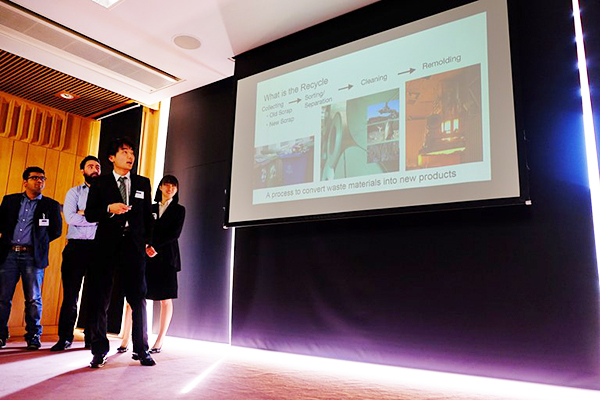
Group presentation
Participants' comments
Preparation
2nd-year doctoral student
Mechanical Science and Engineering
As this was only a short one-week program, I prepared under the assumption that it would not affect my degree. I am planning to proceed in the world of academia, so I expected this opportunity would allow me to expand my network. My academic advisor provided me with detailed information about the workshop. Regarding pre-travel preparations, I prepared based on my previous experiences at domestic and international conferences.
Activities and impressions
1st-year doctoral student
Metallurgy and Ceramics Science
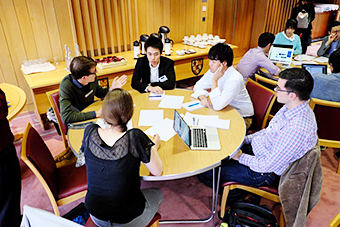
Group work
First, the Japanese and UK students made 10-minute poster presentations, and, based on evaluation by faculty and participating students, eight from each country were selected to proceed. Next, each of the sixteen selected made a two-minute presentation and was judged again by the faculty and students. Finally, a total of eight students were selected to make oral presentations on the following day. I was fortunate to pass the selections process and give a presentation at the last stage. Also, through the group work, I was able to take on a leadership role and actively participate in the discussions on cutting-edge science.
2nd-year master's student
Innovative and Engineered Materials
This workshop mainly consisted of research presentations and lectures, but I was able to engage in deep exchanges with professors and students from each participating university. Having had this chance to hear presentations in fields unrelated to my major, I would like to have opportunities to socialize like this in my major field as well.
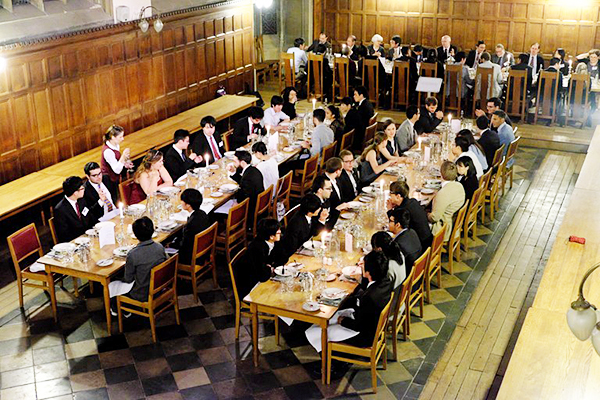
Formal dinner
Episodes in which you felt personal growth
1st-year master's student
Mechanical Science and Engineering
Though this program was titled "UK-Japan Symposium", not only Japanese and British students but also Spanish, Swedish, Chinese, and Indian students participated. Also, more than half of the participating students were doctoral students, and only four students were first-year master's students like myself. Never having had opportunities like this, it was very hard for me to make a presentation at such a high-level, but it was also fun. Seeing PowerPoint presentations by students was most impressive for me. Despite not being native speakers, each spoke fluently in English and answered questions in the Q&A sessions without hesitation. I felt painfully aware of my own incompetence.
1st-year doctoral student
Electronics and Applied Physics
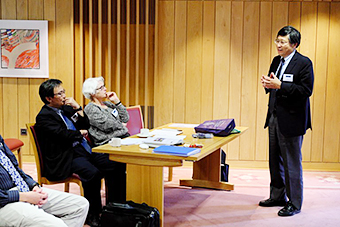
Feedback from Dean Kikuo Kishimoto,
Graduate School of Engineering, Tokyo Tech
Having had few opportunities to contribute directly to my own field of research, I realized anew how Japanese my way of thinking was regarding approaches to research and scholarly activity. My image of the doctoral degree system overseas and thoughts on career paths changed a lot. Though there is a possibility that my job search activities may be delayed, I realized that having a wide variety of experiences will greatly change the way I argue and think. Also, as the main subject of the symposium was totally different from my research field, I found it very difficult to explain my research background to other students. Since my ability to concisely convey my ideas to others was poor, I felt I should seek further opportunities to strengthen my skills.
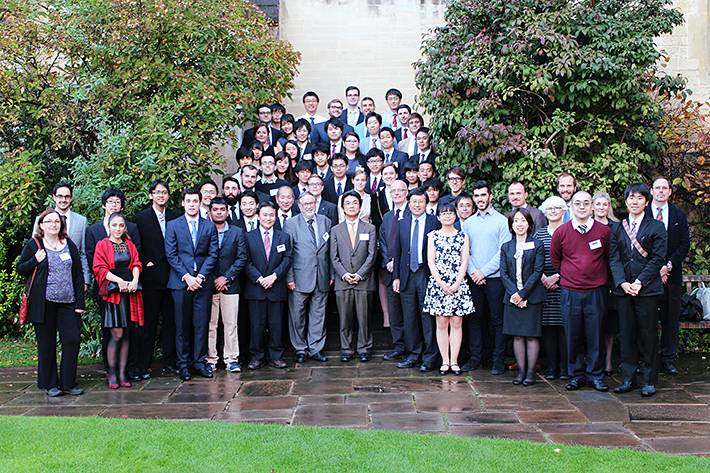
Group photo before formal dinner
. Any information published on this site will be valid in relation to Science Tokyo.








